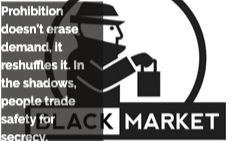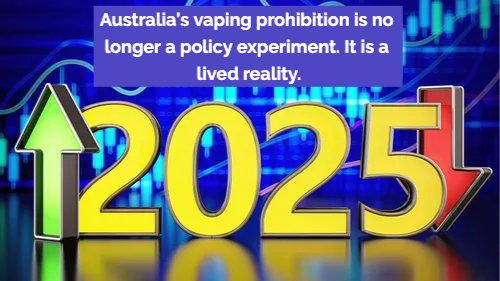A Day in the Life of a Black-Market Vape Dealer
- Alan Gor

- Aug 24, 2025
- 4 min read

Alan Gor 24 August 2024
A satirical stroll through the consequences of prohibition Morning: alarm, espresso, inventory audit
He wakes at 6:15, bleary-eyed and entrepreneurial. Not because he loves spreadsheets, he doesn’t, but because the margins on nicotine salts are a math problem he can’t ignore. He pours coffee into a mug that says “LEGITIMATE BUSINESS OWNER” (the irony makes him feel civic), flips open a spreadsheet named definitely_not_illegal_inventory.xlsx, and begins his morning audit.
He checks the stash like a sommelier checking barrels: bright fruity, custard, mango, all judged by scent memory and Instagram photos. He updates prices in his head the way a weather forecaster updates storm paths: “If the cops raid the port, add 20%. If the Prime Minister mentions vaping on Q&A, add 12% and a dash of hysteria.”
Mid-morning: PR, logistics, and customer relations
He runs a boutique customer service operation. Text messages are answered with the same care a concierge uses for a five-star hotel: “Yes, we have 30-ml mango. No, you can’t do a bulk discount unless you subscribe to my newsletter.” His marketing is artisanal: hand-drawn flyers folded into origami swans, QR codes that only load in certain browsers, and a TikTok account with a wink and a blurred face.
There’s a whole etiquette to being a black-market vape dealer in a prohibition economy: don’t sell to minors (because he remembers his Granny and doesn’t want jail), don’t post selfies, and never ever complain about taxes online; federal agents do not appreciate sarcasm. He’s cultivated a community: weary smokers who finally found a less smoky way to breathe and a few thrill-seekers who like the drama of illicit buying.
Lunchtime: the economics lesson nobody asked for
He meets a contact at a suburban servo. They exchange goods and an abstract handshake, no receipts, no date stamps, just trust and a dodgy air freshener. He thinks about how strange it is that a legal cigarette pack costs a mortgage payment for the week, while the safer alternative is pushed into the shadows. He does not smuggle anything more dangerous than disappointment: payloads are carefully vetted for quality, not crime.
He overhears a passerby at the servo say, “Prohibition works, it kills demand.” He laughs on the inside and not at all on the outside. Prohibition, in his experience, does something else: it makes good products more expensive, forces them into unregulated circuits, and gives charismatic mafioso-types the kind of job description they never applied for.
Afternoon: quality control and accidental philosophy
Back at base (a modest apartment with suspiciously many succulents), he runs a QC test with the solemnity of a lab tech but without the lab coat (safety first, optics matter). He’s careful. He reads forums for real-world feedback, ignores the doomscrolling headlines, and fixes a leaking pod with the patience of someone rewiring a vintage radio.
Between adjustments, he scrolls through policy updates. There’s a ministerial quote about protecting kids, followed by an editorial praising the crackdown. He nods, headlines are part of the job description now, but his mind keeps returning to the people he’s helped: an elderly ex-smoker who can now garden again without coughing; a barista who used to smoke two packs a day and now talks about marathon training. These human stories are inconvenient to moral panics.
Late afternoon: risk, romance, and paperwork that isn’t paperwork
He invoices using code words and a series of emojis. “Blue penguin for delivery tomorrow” actually means “yes, same time.” He arranges safe-drop locations that sound like startup co-working spaces: “Meet at the fountain, bring exact change, play it cool.” Romance in his life is ephemeral, mostly with sympathetic baristas who secretly ask for discounts, but he’s serious about one thing: harm reduction.
He knows his trade contributes to a paradox: outlawed but lifesaving. It’s a weird moral knot. He fixes it the way he fixes leaky pods clumsily, pragmatically, with duct tape metaphors and a side of guilt.
Evening: the long tail of prohibition
Night brings the heavier feelings. He reads letters from customers: “My son stopped chain-smoking after switching.” “My doctor said vaping helped me get off the cigarettes I’d smoked for twenty years.” Those notes are a balm against the fear of raids, the threat of violence from real criminals, and the knowledge that good intentions are often punished when policy swings the wrong way.
He thinks about the people who profit from prohibition: smugglers who don’t care about labelling or nicotine strength, bureaucrats who cheer the optics but don’t taste the smoke, and multinational companies that quietly adjust pricing while lamenting “public health.” He wonders if politicians ever sit down with people who smoked and quit — not journalists or think tanks, but actual ex-smokers with oxygen-free stories.
Nightcap: reflection, not recipes
At 11:47 p.m., he closes his ledger, turns off his “business” Instagram, and sits in the dark with a vape that smells like summer fruit and second chances. He knows he’s playing a part in a perverse feedback loop: prohibiting a safer alternative creates demand for illicit supply that lacks oversight, can harm people, and institutionalises risk.
He dreams of the day it’s not a cat-and-mouse game when adults can access regulated, labelled, quality-assured products and the black market is a memory like rotary phones and dial-up internet. Until then, he’ll keep doing inventories, answering texts, and offering a safer breath to the people who need it most, a quietly subversive form of public health
Prohibition doesn’t erase demand, it reshuffles it. In the shadows, people trade safety for secrecy. This fictional dealer is a satire, but the moral is sober: when safer options are criminalised, harm doesn’t disappear; it migrates. If we care about public health, maybe it’s time to stop making the safest path the hardest one.


